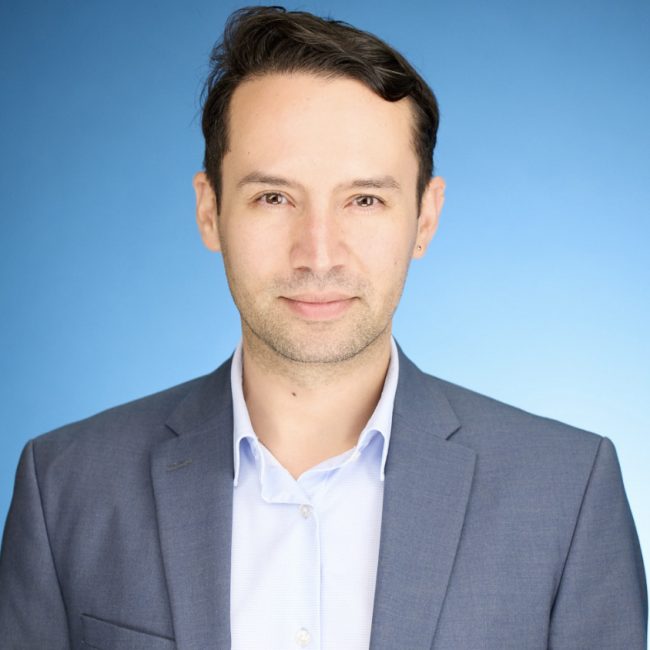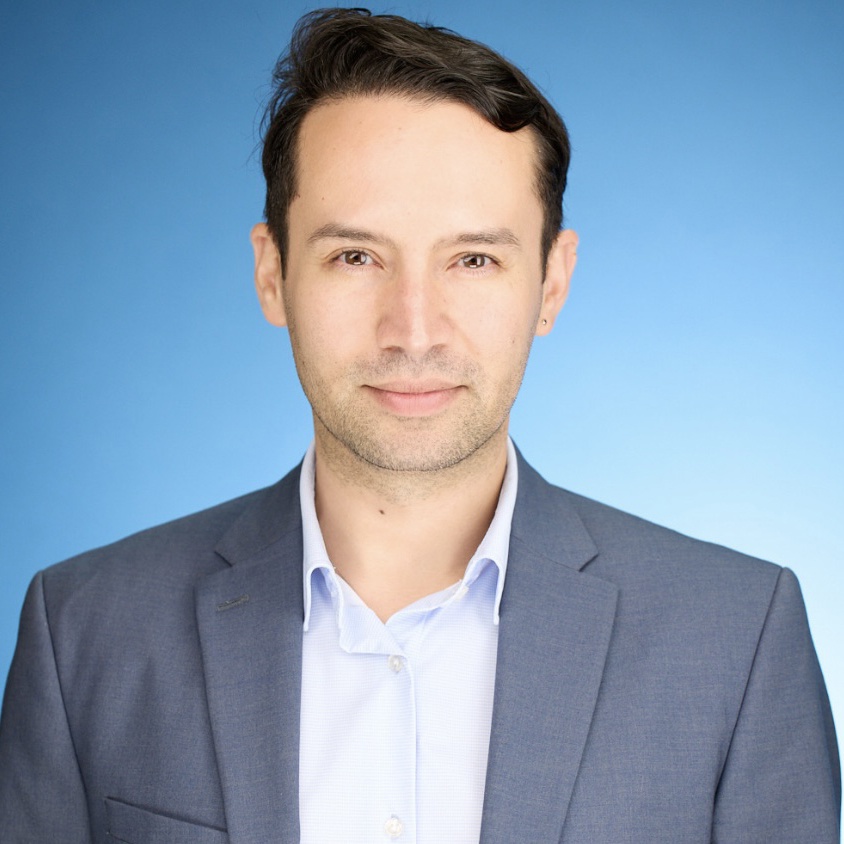Curated conversations with data and AI for social impact leaders on their career journeys
Pathways to Impact is a series of conversations with data for social impact leaders exploring their career journeys. Perry Hewitt, Chief Strategy Officer of data.org, spoke with Julian Stillman, the chief of staff at the HOPE Program, a nonprofit advancing economic mobility, workforce development, and environmental sustainability in New York City.
Tell us how you found yourself at the HOPE Program, and any context around the role data and AI have played in the work that you do.
When I moved from Colombia to the United States in 2017, I was looking for a job where I could help change the world. My first impulse was the United Nations, but someone suggested that I look for something in the nonprofit sector. I was fortunate to land at the Bedford Stuyvesant Restoration Corporation, the first community development corporation in the country. I started as a financial counselor and worked my way up to director. After several years, I had the opportunity to apply for a job as a chief of staff at the HOPE Program, where I could apply my skills to their initiatives in workforce development, with particular emphasis on the green economy.
The HOPE Program was looking for someone data-oriented; My experience as Director of Program Compliance meant that working with data was part of my everyday responsibilities, ensuring we met reporting and compliance requirements. That background helped me secure the role.
Once at HOPE, I started to evaluate the data to align with our new strategic plan, Home Of Prosperity and Empowerment, and with a focus on growth at our 40th anniversary. When you’re making decisions, you need good data!
And data leads naturally to AI. The need to develop and deploy AI was something that we started to hear from our partners. Funders were suggesting that we consider AI tools to be more efficient in conducting research for grants and for grant writing. At first, everybody was familiar with only those tools that took notes during a meeting. Learning how to engage with generative AI tools like ChatGPT, Gemini, or Copilot was something new.
We tried to start to bring it into our daily work, but we were not fully sure what we should do, given our concerns about data privacy. We sought guidance from private companies as well as other nonprofits on how to handle these concerns, and landed on creating a data policy as a first step. From practice to policy, data is the bedrock of a lot of my work here.
AI is going to change and take away a lot of existing behaviors. And create new ones: AI tools and agents are becoming collaborators in daily work. We need to figure out how to become more efficient, and also how to retain the human touch and insight.
Julian Stillman Chief of Staff The HOPE Program
Are you seeing widespread AI adoption in the social sector more broadly?
Very recently, I attended a meeting with about 15 nonprofits. Before the meeting, they surveyed the group to ask where they stood in their AI journey, and I was surprised that only 7% reported actively using AI in their day-to-day work. This is not a statistically significant sample, but an example of what I see. Everybody’s trying to figure out the right tools to use and, most importantly, the right way to use them without compromising privacy. We understand that transparency is essential, and the importance of privacy for our participants and our community. That’s the context in which we, and many other nonprofits, are operating.
We realize that change is coming. I remember when the adoption of the internet became widespread, and how much it changed work and the world. AI is going to change and take away a lot of existing behaviors. And create new ones: AI tools and agents are becoming collaborators in daily work. We need to figure out how to become more efficient, and also how to retain the human touch and insight. We’re going to use AI, but we want to be sure that we are doing it the right way.
Part of the Pathways to Impact series
What problem are you trying to solve at the HOPE Program, and where do data and AI fit in?
The HOPE Program helps New Yorkers build sustainable futures. We serve adults over 18 years old: 95% of our participants are from low-income communities; 90% are BIPOC, Black, Indigenous people of color. Around 50% of our participants have faced homelessness. We also work with a lot of formerly incarcerated people, a focus that we are known for in this sector.
One HOPE priority–which I really admire–is that we serve communities that are highly impacted by environmental issues. For example, right now we are working in the South Bronx, where environmental, economic, and social disparities are all high.
Data is a way to help us figure out how we should move forward to solve the systemic challenges we face. Now we’re taking that data and putting it into AI tools to help us deeply research how this data can affect what is happening in the world. That plays a role in steering our direction.
Here’s a specific example: the US federal government recently changed its funding priorities. Our task was to figure out how to navigate these rapid changes without an expert on hand. We were able to use AI to check all the executive orders and understand the potential impact on the services our organization provides, particularly the training focused on the environmental or green sector. Using AI helped us understand the impact.
Were there any unexpected blockers to your career entry or progression, or your move into this field?
Language was more of a barrier than I expected. When I applied for that first job in the US, my initial phone interview in English was a big challenge. As someone who enjoys networking and spends a lot of time with people, I was frustrated—but it reminded me to continue working, to improve my professional English, and to build a network here.
Living in New York has helped. There is a love for immigrants, for people coming from different places around the world. Practically everybody has an accent, and that helped me gain confidence.
What community of people or resources bolsters your work today?
I am supported by the community of people we serve.
The community connection is powerful if you deeply believe in the mission of the organization that you’re working with or working for. I believe in what we do, absolutely. Maybe I’m not facing the same issues and challenges that our community faces, but as an ally, I try to see how my skills can help this community.
I also have benefited from cohort work with people solving similar problems with data and AI. When I was with the Restoration Corporation, we participated in the data.org Data Maturity Assessment (DMA) cohort funded by Microsoft. We spent six months learning together about different topics and reviewing our results. We had a lot of interesting findings about our data culture, and it helped us shift the organization in the right direction. Almost 15 months later, I asked a former colleague how it’s going with the data culture. Apparently, it has really continued because of this cohort work. That is affirming.
More than ever, we need to be thoughtful, ethical, and discerning about the outputs we get, whether they come from AI or any other advanced technology.
Julian Stillman Chief of Staff The HOPE Program
Which skills—not necessarily related to data and AI—have helped you in your career?
I would say soft skills, which might seem counterintuitive because this is a workforce development organization, and we are training people to become better in their jobs. I always say the only thing that is going to make a difference is the soft skills and how you interact with people. You can learn a tool, you can learn the job responsibilities, but how you interact with others and show respect is critical. So much is about empathy and understanding.
When the soft skills are missing, it makes a difference. For example, we noticed during COVID how young people started to become very attached to technology, and how they were missing interactions with others. There was a high cost: after COVID, they didn’t know how to be in spaces with other people. Soft skills matter.
What advice do you have for someone interested in doing this work? What have you seen as differentiators for success?
Focus on what you want and where you believe you can make a difference in the challenges you want to solve. Be unafraid of taking on new opportunities, because if you’re afraid, you might be setting yourself up for failure. Gain some learning from each new opportunity—even a work experience that is not the right path can set you on a different, right direction for you.
In my view, what really sets people apart today is the ability to bring together analytical, creative, and critical thinking. With so much information out there and AI now part of the process, it comes down to staying curious and asking the right questions. More than ever, we need to be thoughtful, ethical, and discerning about the outputs we get, whether they come from AI or any other advanced technology.
What do you see emerging as the next big thing in data and AI for social impact?
In my case, I’m very focused on equity in data and AI and would like to see that emphasis become more common. Every time I’m analyzing data, I’m trying to evaluate an equity component, because I believe that it’s the only way to make decisions that are focused on social impact. The same is true with AI, which is becoming a collaborator.
Increasingly, we are applying data and AI to better understand and improve green metrics. For example, reducing heat in buildings and realizing energy savings. Getting and acting on good metrics is something that we want to expand. We are starting to use AI to get some specific points that maybe we are not able to collect, but we are able to compare. We want to use more data and AI in the coming months to improve not only our participants’ outcomes but also those of their families and communities.
We are committed to sharing those findings. Sometimes we make decisions based on the data we see, but in the end, we are serving the communities. It is important to share findings and ensure that the community understands your work and the metrics behind it. Their input is valuable. Maybe the community can help you to identify gaps and opportunities – a new metric, a new outcome, or another service that the community needs.
What’s your don’t miss daily or weekly read?
I spend a lot of time in two apps: The New York Times and Masterclass. These keep me up to speed on news and help me continue to work on soft skills. Masterclass helps me explore topics like how to become a better communicator and personal growth. A lot is changing all around us, but we can always work on ourselves.
About the Author
Chief Strategy Officer Perry Hewitt joined data.org in 2020 with deep experience in both the for-profit and nonprofit sectors. She oversees the global data.org brand and how it connects to partners and funders around the world.
Read moreSeries
Pathways to Impact
This data.org series interviews leaders in Data Science for Social Impact with a lens of how they got there, as well as the skills and experiences that have fueled their career progression.


